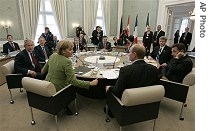2007年VOA标准英语-Friday's G-8 Summit Talks to Focus on Africa(在线收听)
Heiligendamm
07 June 2007
Leaders of the world's richest industrial nations wind up their three days of meetings in northern Germany on Friday. Their last day is to be devoted mostly to Africa - alleviation of poverty, debt relief and aid. VOA's Sonja Pace reports from near the G-8 summit site at Heiligendamm.
"My name is Isiah, from Tanzania. I was born in Africa."
Seventeen-year old Isiah, is among a group of young people invited to address G-8 leaders in Heiligendamm. The issues raised, including poverty and HIV-AIDS, have been on everyone's lips.
 |
| G-8 leaders are seen during a working meeting in Heiligendamm June 7, 2007 |
Mrs. Merkel spoke of general agreement on the need for greater assistance to Africa and urged a renewed commitment to make it happen.
U.S. President George Bush highlighted his government's $30 billion pledge to provide HIV/AIDS drugs for Africa and he called for a strong commitment from the G-8.
"I come with a deep desire to make sure that those suffering from HIV/AIDS on the continent of Africa know that they will get help from the G-8," Mr. Bush said.
British Prime Minister Tony Blair said it is time to follow-up on aid commitments made by the G-8 in Gleneagles, Scotland two years ago.
"We have also got to focus on recommitting ourselves to the Gleneagles process on Africa, on making major steps forward there," he said.
Aid experts and activists say, however, a simple "re-commitment" is not enough. South African anti-poverty activist, Kumi Naidoo says the Gleneagles promises on aid and debt relief were modest at best and even these were not fully implemented. And he says he sees no sense of urgency to make this summit different.
"We want to just clarify that when we come here as Africans to the G-8 we are not coming to ask for charity, we are coming here to claim justice and the tone of the discussions [in the G-8] is lacking in inspiration, lacking in courage and lacking in leadership," Naidoo said.
Charles Abani, the Africa spokesman for the aid organization, Oxfam says the daily reality in Africa is grim.
"Four-thousand children dying every day from diarrhea ... 1,400 women dying of [child]birth-related complications in a world that technologically has really advanced. This is really unacceptable. These are daily statistics of people dying in Africa and yet we sit here and wonder about promises. It is almost like moving from disbelief to anguish," said Abani.
Abani says fulfilling aid promises would cost only one additional dollar per person in G-8 countries.
G-8 leaders have reached a compromise on tackling climate change. Some see the agreement as substantial progress while others describe it as weak and ineffective. Climate change, says Abani is not just an issue for wealthy nations - it affects Africa as well.
"Who is climate change going to affect worst and hardest? Again, it is developing countries, again it is Africa. In Mozambique, the flood is every two or three years now and 200,000 people are displaced and rendered homeless. In Kenya, the floods used to come in cycles of 15 years, they come every other year now," said Abani.
Friday has been set aside to deal with African issues as G-8 leaders meet with the so-called Africa Outreach Group, which includes a number of African presidents, including Senegal's Abdoulaye Wade, Nigeria's Umaru Yar'Adua and Ghana's John Kufuor.